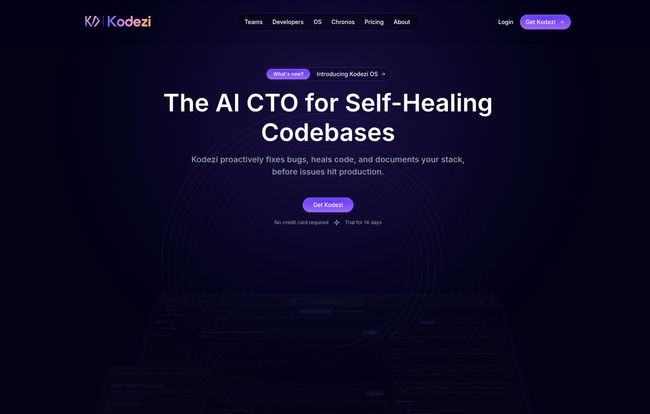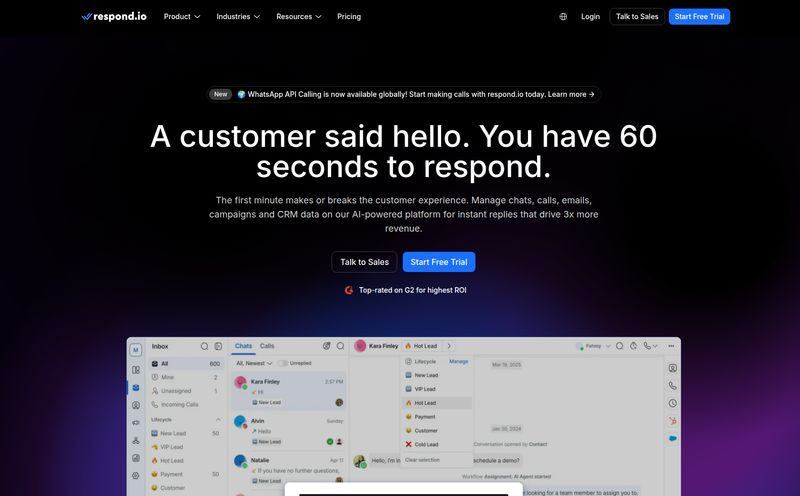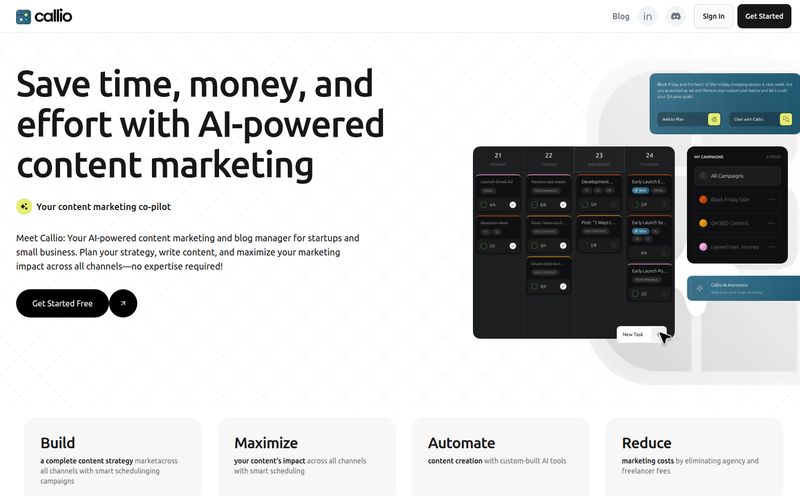We’ve all been there. It’s 2 AM, you’re staring at a screen, fueled by coffee and sheer willpower, trying to hunt down a bug that makes absolutely no sense. A misplaced semicolon, a logic error that’s been staring you in the face for three hours... It’s the not-so-glamorous side of being a developer. For years, the dream has been a tool that doesn’t just highlight errors, but actually understands them. A partner in crime, if you will.
Well, the AI wave is here, and it’s bringing some seriously interesting tools to the table. I’ve been keeping my eye on a bunch of them, and one name that keeps popping up is Kodezi. It bills itself as an “AI CTO for Self-Healing Codebases,” which is a pretty bold claim. But as someone who's spent more time than I'd like to admit in the debugging trenches, my curiosity was definitely piqued. So, I took it for a spin.
So What Exactly Is Kodezi?
Okay, let's cut through the marketing speak. At its core, Kodezi is an AI-powered assistant designed to make a developer's life easier. Think of it less like a simple linter or a spell-checker for your code, and more like having a patient, ridiculously knowledgeable senior dev pair-programming with you, 24/7. It doesn’t just flag problems; it suggests fixes, optimizes your work, generates new code from prompts, and even writes your documentation. Yeah, you read that right.
It integrates into your workflow, aiming to catch bugs before they ever become a problem, improve the quality of your code, and generally take the tedious, repetitive parts of coding off your plate. This frees you up to focus on the bigger picture—you know, the actual creative problem-solving that got us into this field in the first place.

Visit Kodezi
My First Impressions and The Standout Features
Getting started was pretty straightforward. But it's the features where things get really interesting. It’s not just one trick pony; it’s a whole suite of tools rolled into one.
The Bug Squasher and Code Healer
This is Kodezi’s bread and butter. The platform’s ability to auto-correct code is uncanny. It’s not just about syntax errors. Kodezi digs deeper, identifying potential runtime errors and vulnerabilities. I fed it some old, buggy Python scripts I had lying around, and it was impressive how quickly it not only found the issues but offered concrete, usable solutions. It explains why something is a bug, which is a fantastic learning tool, especially for junior devs or students. It turns the drudgery of debugging into a quick pit stop rather than a full-blown engine rebuild.
Your Personal Code Generator and Translator
Ever been stuck trying to write a complex function or just need some boilerplate code whipped up fast? Kodezi’s code generation is a huge time-saver. You describe what you need in plain English, and it spits out a functional block of code. Of course, you should always review AI-generated code, but as a starting point, it’s phenomenal.
Even cooler, in my opinion, is the code translation. Need to convert a function from JavaScript to Python? Or from C++ to Java? Kodezi can handle it. For teams working across different tech stacks or modernizing legacy systems, this feature alone could be worth the price of admission. It’s not perfect, but it gets you 90% of the way there, saving hours of manual rewriting and testing.
Keeping Things Tidy with Optimization and Documentation
Let's talk about two things every developer loves to hate: optimization and documentation. Kodezi tackles both. It analyzes your code for inefficiencies and suggests ways to make it run faster and cleaner. This is a subtle but powerful feature for maintaining high-performance applications.
But the auto-documentation... wow. You know that feeling when you inherit a project and the docs are either non-existent or from 2012? Yeah, that. Kodezi helps prevent you from being that person to the next developer. It automatically generates detailed documentation for your functions and APIs, ensuring your codebase remains understandable and maintainable. A true godsend.
Let's Talk Money: A Look at Kodezi's Pricing
Alright, this is the part everyone always scrolls down to. Is it affordable? The pricing structure is tiered, which I appreciate. There’s something for almost everyone, from students to full-blown enterprise teams.
| Plan | Price (Monthly) | Who It's For | Key Features |
|---|---|---|---|
| Kodezi Code | $0 | Students & Hobbyists | Basic tools, Free trial access, 50 credits/month |
| Kodezi Pro | $9.99 | Individual Developers & Freelancers | Full Web IDE access, 250 credits/month |
| Kodezi CLI + OS | $59.99 per seat | Professional Teams & Companies | CLI integration, Dev-Stack integration, Ticket Automation |
Prices are based on information from the Kodezi website at the time of writing and may be subject to change.
The free tier is generous enough to really get a feel for the tool. The Pro plan at ten bucks a month feels like a steal for a serious solo developer. The team plan is where the investment gets real, but for a company, the productivity gains from features like ticket automation could easily justify the cost.
The Good, The Bad, and The AI
No tool is perfect, and it's important to have a balanced view. After playing around with Kodezi, here's my honest take.
What I Love About Kodezi
The productivity boost is undeniable. It just shaves so much time off the mundane parts of coding. Less time debugging means more time building cool stuff. The code quality genuinely improves, as the AI often suggests more elegant or efficient solutions than what you might have come up with on a tight deadline. And its support for multiple languages makes it incredibly versatile. It’s a powerful ally for anyone writing code.
Some Things to Keep in Mind
First, the price for the team plan could be a hurdle for smaller startups or agencies. It’s an investment, for sure. Second, like any AI, it’s not infallible. You still need your own brain and expertise to vet its suggestions. There’s a risk, especially for those learning to code, of becoming too reliant on the tool and not developing those core debugging muscles. It's a crutch, a powerful one, but you still need to know how to walk without it.
My Final Verdict: Is Kodezi Worth It?
So, is Kodezi the future? I think it’s a very significant step in that direction. It’s one of the most comprehensive AI developer assistants I’ve seen. It’s not just a feature; it’s a full-fledged platform designed to integrate into a professional workflow.
For individual developers, the Pro plan is a no-brainer. For the price of two fancy coffees a month, you get a tool that can save you hours of work every week. For teams, the CLI + OS plan is a serious contender if you're looking to standardize code quality and speed up your development cycle. I'd recommend starting with the free trial, throwing some of your most annoying code at it, and seeing for yourself. I have a feeling you’ll be pleasantly surprised.
Frequently Asked Questions About Kodezi
Is Kodezi actually free to use?
Yes, there is a free plan called Kodezi Code. It gives you basic access and 50 credits per month to test out the features. It's a great way to see if it fits your workflow before committing to a paid plan.
What happens if I run out of my monthly credits?
Once you use up your credits for the month, you'll have to wait until they reset on your next billing cycle, or upgrade to a higher-tier plan to get a larger credit allowance.
Can I use Kodezi for any programming language?
Kodezi supports a wide array of popular programming languages, including Python, JavaScript, Java, C++, and many others. Its multi-language support is one of its strongest features.
Is it difficult to integrate Kodezi into my existing projects?
Not at all. The web IDE is self-contained, and for team plans, the CLI (Command Line Interface) is designed to integrate smoothly into existing development stacks and workflows. The goal is to assist, not to disrupt.
Will Kodezi steal my code?
This is a common and valid concern with AI tools. According to Kodezi's policies, they prioritize user privacy and data security. However, as with any cloud-based tool, you should always review the privacy policy and terms of service, especially when working with proprietary or sensitive code.
Can an AI tool really replace a human developer?
In my opinion, no. Tools like Kodezi are assistants, not replacements. They handle the repetitive, time-consuming tasks, but they lack the creativity, context, and business understanding of a human developer. It’s a tool to make good developers even better and faster.



